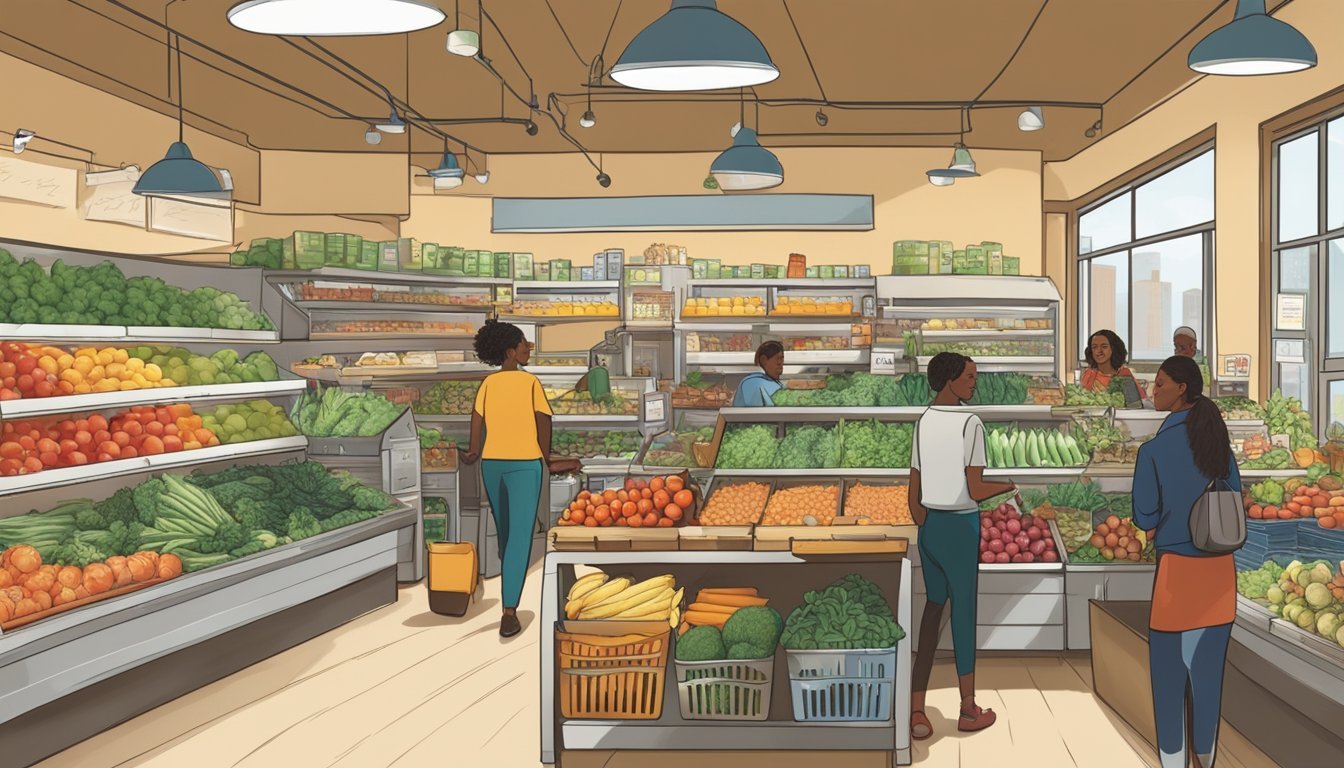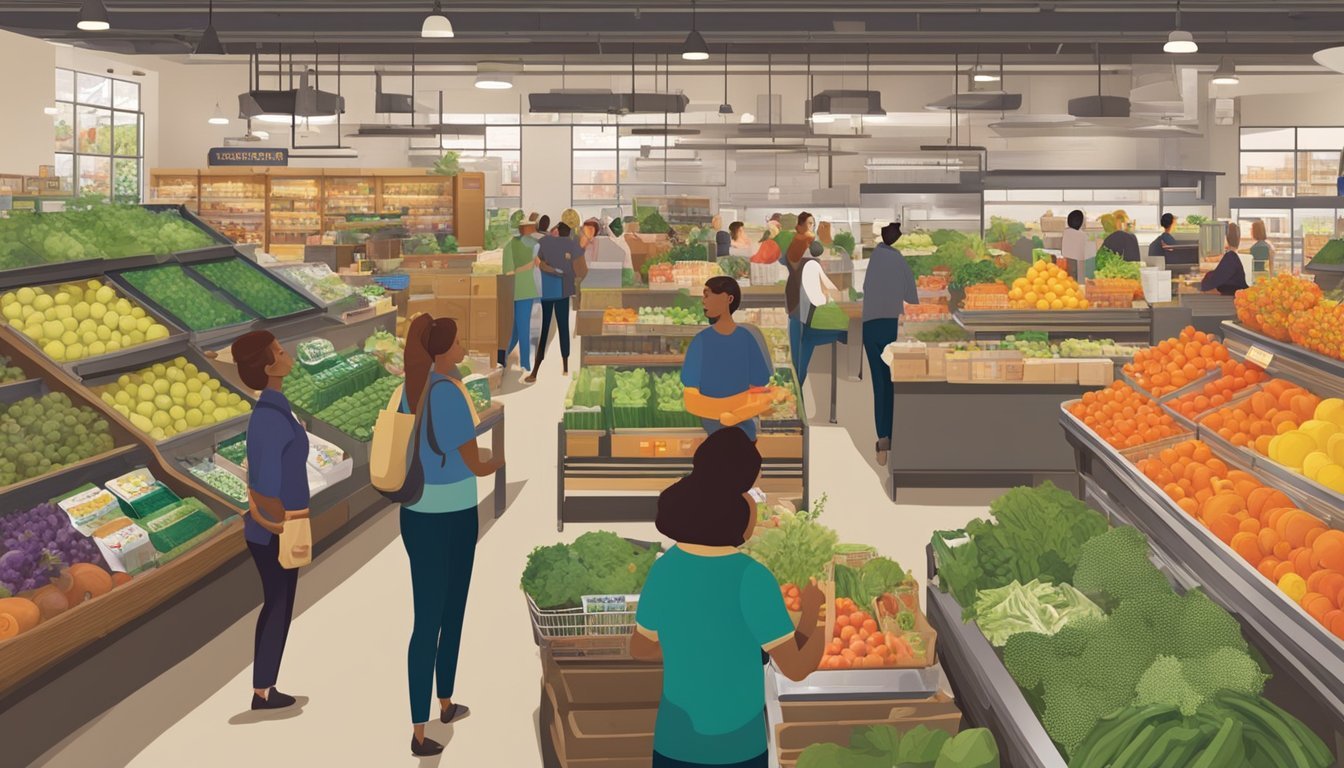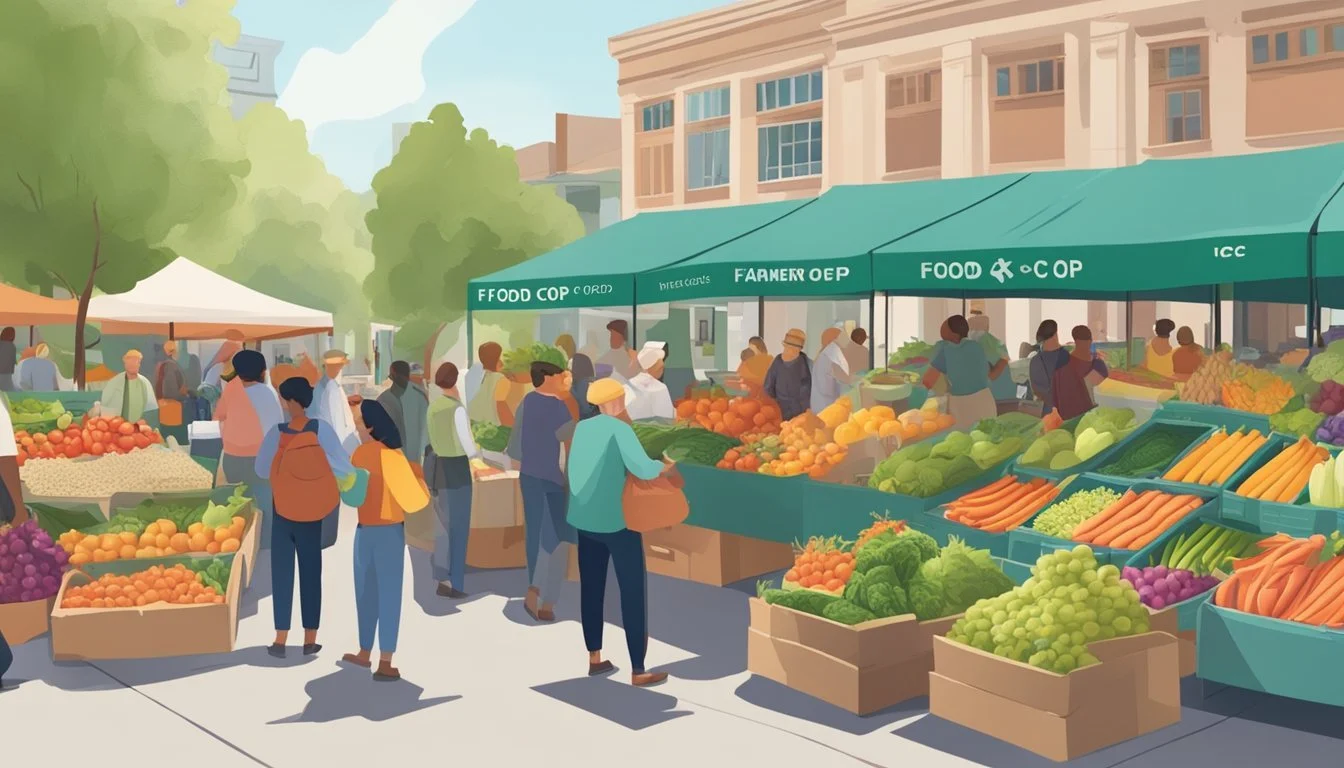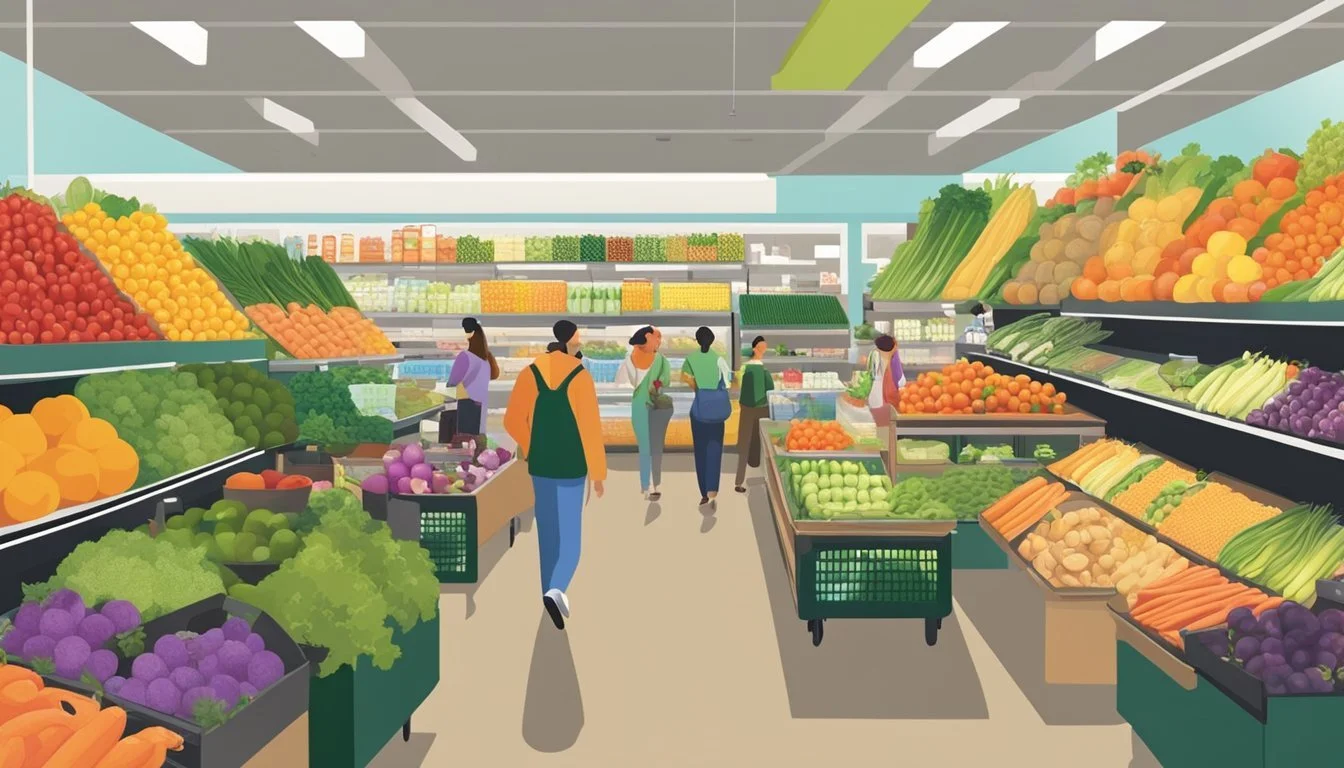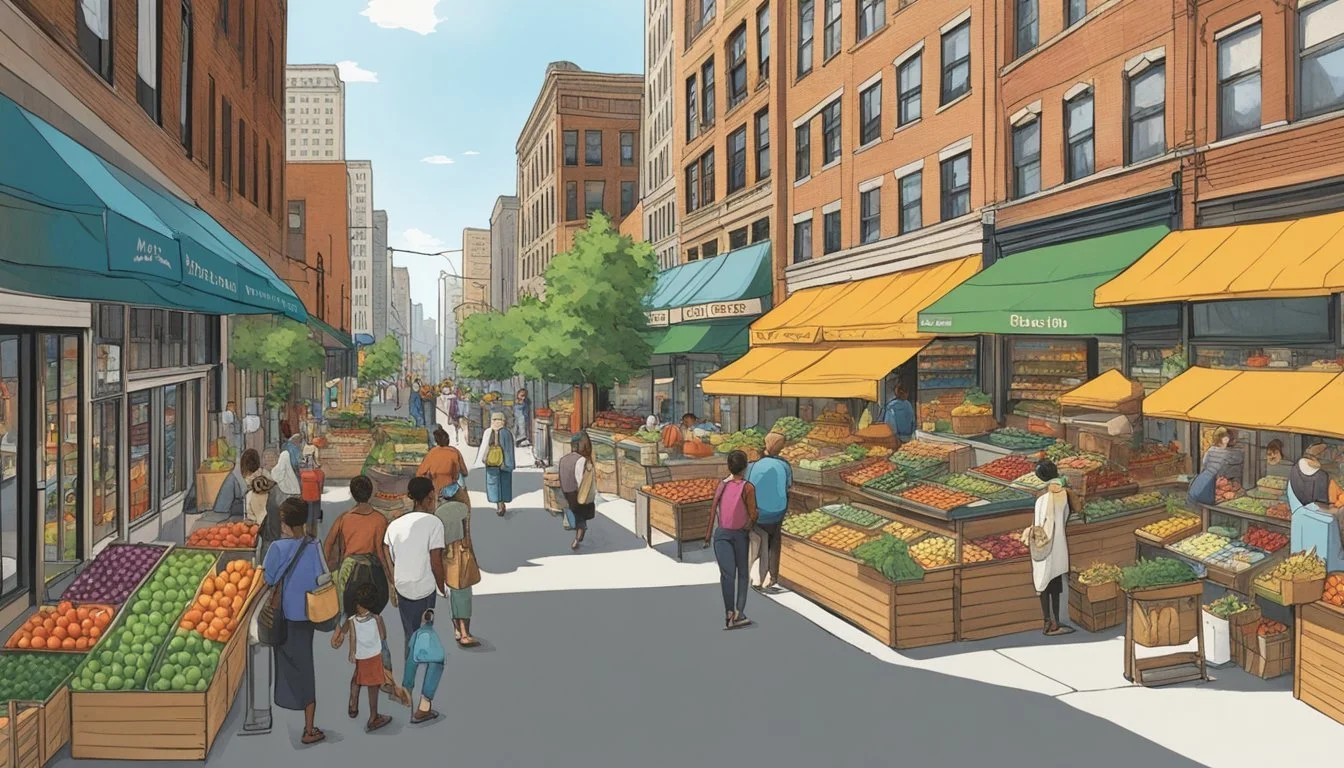Guide to Food Co-Ops in Chicago, IL
Your Essential Directory
Food cooperatives, or food co-ops, have become a significantly important part of the urban fabric in Chicago. These community-centric organizations operate on a membership basis, but often welcome non-members to shop as well. The core philosophy behind a food co-op is to provide a space for consumers to access fresh, locally sourced and often organic produce and goods. In doing so, they support local farmers, contribute to the local economy, and offer healthier food options to the community.
In Chicago, a city known for its diverse culinary scene, food co-ops serve as essential hubs for residents who value sustainability and want to engage with their food sources more directly. By prioritizing goods from local producers, these co-ops not only foster a closer connection between growers and consumers but also help to reduce the carbon footprint associated with long-distance food transportation. This alignment with slow food practices underlines a commitment to environmental stewardship and socially responsible consumerism.
Each food co-op in Chicago has its own unique charm and offerings, encouraging a sense of unity and shared mission among shoppers. Whether it's a storefront focused on organic products, a cooperative supporting family-owned farms, or a market accepting nutritional assistance programs, these establishments are tailored to meet the needs of their local neighborhoods. They have become integral parts of the communities they serve, providing spaces that are more than just grocery stores – they are places where connections are made, ideas are shared, and a collective vision for a sustainable future is fostered.
History of Food Co-Ops in Chicago
Food cooperatives, or "co-ops," have a notable history in Chicago, tracing back to various economic and social movements. The Hyde Park Co-Op, established in 1932, was one of Chicago's early examples, born out of a desire for high-quality, affordable food during the economic challenges of the 1930s. The co-op's success was a testament to the community's commitment to mutual benefit and sustainable practices.
The 20th century saw waves of popularity for food co-ops. For instance, news source WBEZ Chicago reports that the pandemic brought mixed effects on these institutions. A prominent example in recent years includes the Wild Onion Market, a community initiative reflecting the enduring appeal of cooperative grocery stores in Chicago.
Chicago's co-ops are defined by:
Community ownership: Members have a stake in the store, influencing its products and practices.
Commitment to quality: Offering products sometimes deemed superior to those at big supermarket chains.
Economic resilience: Ability to adapt and endure through various economic climates.
Despite fluctuations in their numbers over the decades, food co-ops in Chicago have consistently provided alternatives to the traditional grocery marketplace, aligning with globally recognized cooperative principles. They serve as cornerstones for local food sovereignty and are celebrated for their role in fostering direct connections between consumers and their food sources.
Benefits of Joining a Food Co-Op
When individuals join a food co-operative, commonly referred to as a food co-op, they gain numerous advantages both personally and within their community.
Economic and Community Impact
By supporting a food co-op, members keep more money circulating within their local economy. Co-ops often prioritize sustainable business practices that benefit not only the economy but also the environment.
Access to High-Quality Food
Members have access to a variety of quality foods, which are often organic and sourced from local farmers. This direct relationship between co-ops and producers ensures freshness and reduces transportation emissions.
Health Benefits
Food co-ops prioritize the health of their community by increasing access to affordable, healthy food options. This improves food access and can foster a community-wide appreciation for nutritious eating habits.
Pricing and Affordability
Fair Pricing: Through collective buying and wholesale pricing, co-ops can offer members food at more affordable prices.
Member Discounts: Members can benefit from exclusive discounts, further improving access to quality food.
By joining a food co-op in Chicago, members enjoy benefits that extend beyond just personal gain; they contribute to a more resilient and health-conscious community.
Popular Chicago Food Co-Ops
Chicago's community-focused food landscape is enriched by several standout food co-ops. These member-owned establishments prioritize local, sustainable, and ethical food sourcing, offering unique shopping experiences across the city's neighborhoods.
The Dill Pickle Food Co-Op
Located in Logan Square, The Dill (how long does dill last?) Pickle Food Co-Op is a prominent figure in the Chicago food co-op scene. It provides a wide range of organic and gluten-free options, catering to various dietary needs. The co-op commits to environmental sustainability and supporting local farmers and producers.
Chicago Market: A Community Co-Op
Chicago Market aims to build a local, sustainable food economy through a cooperative grocery model. It's known for being member-owned and operated, ensuring that the community has a direct impact on product selection and business practices. The Chicago Market focuses on transparency and connecting consumers with their food sources.
Sugar Beet Food Co-Op
Situated in Oak Park, Sugar Beet Food Co-Op serves as a neighborhood cornerstone for healthy and locally-sourced groceries. Their shelves are stocked with products from area farmers, providing an array of fresh, high-quality food items. The Sugar Beet emphasizes education on food issues and builds strong community partnerships.
How to Participate in a Food Co-Op
Participating in a food co-op allows individuals to engage with a community-oriented marketplace. They can contribute to the cooperative's success through active membership, volunteer work, and involvement in co-op events and meetings.
Membership Information
To join a food co-op in Chicago, one must typically purchase a share, indicating a financial investment and ownership in the cooperative. This is a one-time fee that makes the individual a co-owner, along with the right to shop at the co-op. Members often receive benefits such as discounts on products and a say in the governance of the cooperative.
Examples of membership costs and benefits:
Fee: $25 - $300 (usually a one-time payment)
Benefits:
Discount on purchases (5-10%)
Voting rights in board elections
Dividends on profits based on shopping frequency
Volunteer Opportunities
Co-ops often rely on volunteer work to operate efficiently. Volunteer opportunities at a co-op can include assisting in day-to-day operations, such as stocking shelves or helping at the checkout. Participation as a volunteer can further integrate members into the cooperative community and sometimes offer additional benefits like further discounts or educational opportunities.
Common volunteer roles:
Cashiering
Stocking shelves
Product labeling
Inventory management
Community Events and Meetings
Food co-ops host regular community events and meetings focused on various aspects of the co-op, from educational workshops about healthy eating to discussions on future co-op development. Attending these meetings is crucial for members who wish to be involved in decision-making processes. It also fosters a sense of community and joint ownership among the members.
Regularly scheduled events:
Monthly member meetings
Seasonal food education workshops
Annual general meetings (AGM) for major cooperative decisions
Local Sourcing and Products
Food co-ops in Chicago emphasize the importance of strengthening community ties and ensuring food quality by sourcing from local farms and prioritizing organic, sustainable offerings.
Partnerships with Local Farms
Chicago's food co-ops often collaborate with a network of local farms to supply a diverse selection of fresh produce, meats, and dairy. These partnerships enable the co-ops to offer fresh and seasonal items to their customers, with the quality and origin transparently displayed. For instance, consumers might find heirloom tomatoes from a family-owned farm just outside the city limits or grass-fed beef from a nearby sustainable operation.
Organic and Sustainable Offerings
Sustainability and organic farming practices are at the forefront of Chicago co-op offerings. For many co-ops, the goal is to provide a platform for consumers to make environmentally responsible choices:
Organic Produce: A wide range of organic fruits and vegetables are available, often certified to ensure they are grown without synthetic pesticides or fertilizers.
Sustainable Practices: Many co-ops support farms that implement sustainable practices, such as water conservation, composting, and crop rotation.
By focusing on local sourcing and eco-friendly products, these co-ops contribute significantly to the local economy and the well-being of the environment.
Education and Outreach
Food co-ops in Chicago place a strong emphasis on education within the community, focusing on the benefits of healthy eating, understanding nutrition, and fostering food accessibility. These educational efforts are innovative steps for strengthening family and communal ties through the medium of food.
Cooking and Nutrition Workshops
Chicago food co-ops often host Cooking and Nutrition Workshops to educate the public on preparing wholesome meals. The workshops provide hands-on experience and aim to empower individuals and families with knowledge about nutritious food choices, meal preparation, and sustaining a balanced diet. These sessions are tailored to address food access challenges and promote the health benefits of consuming fresh, locally-sourced produce.
Partnerships with Local Schools
Many co-ops forge Partnerships with Local Schools to introduce food education to students. These partnerships help integrate food literacy into the school curriculum and engage children in learning about where their food comes from. By working directly with schools, co-ops enact a proactive approach to instill the value of community and healthy eating habits early in life.
Economic Impact on the Chicago Area
Food co-operatives (co-ops) in Chicago are making noticeable economic contributions to the area. Co-ops prioritize community benefit, often focusing on living wages and healthcare benefits, which can increase financial security for workers. Through programs that help reduce operational costs, they are able to sustain higher standard benefits for employees.
The presence of co-ops also bolsters the local economy by supporting small farmers and distributors. Entities like the Oak Park Village Farmstand serve as micro-warehouses that connect local producers with consumers, fostering a resilient regional food system. This model of direct supply reduces the transportation costs and carbon footprint associated with importing goods, further benefiting the economy and the environment.
Moreover, food co-ops tend to retain profits within the local area, stimulating economic growth. When shoppers choose co-ops over large grocery chains, their money stays within the community, supporting local growth and development. Below is a summarized impact of food co-ops in the Chicago area:
Investment in Local Employment:
Facilitates living wages and healthcare benefits
Encourages job stability and staff retention
Community Engagement and Support:
Boosts local food systems and sustainability
Retains profits inside the Chicago area
Aid to Small Businesses and Farms:
Establishes connections between farmers, small distributors, and consumers
Reduces dependencies on external supply chains
The growth of food co-ops in Chicago represents a move towards an economically supportive system that enhances community welfare and local markets. With several co-op projects in development across Chicago, from north to south, the impact on the area's economy is poised for potential growth.
Navigating Chicago's Food Co-Op Scene
Chicago's food co-op scene offers a unique blend of community-driven grocery shopping experiences and local farmers market produce, all with a strong emphasis on sustainability and inclusivity.
Comparison of Co-Ops
Chicago boasts various food co-ops, each with its own set of benefits for members and the community:
Wild Onion Market: With over 1,400 members, it is one of the growing food co-ops in Chicago focusing on sustainable, locally sourced products.
Dill Pickle: Established in 2009, it stands as Chicago's sole food co-op within city limits since the Hyde Park Co-op closed in 2008.
Sugar Beet Co-op: Located on the border in Oak Park, this co-op emerged in 2014 and prides itself on its community-centric approach.
Comparing these co-ops, shoppers can expect differences in product selection, membership benefits, and community events. Members often gain access to local, organic groceries and the opportunity to influence co-op policies.
Navigating the Farmers Markets
For fresh, locally sourced groceries, Chicagoans turn to the numerous farmers markets scattered throughout the city. These markets provide a platform for small-scale farmers and artisans to sell their products directly to consumers, ensuring freshness and supporting the local economy.
Green City Market: It serves as a prime example of a farmers market at the heart of Chicago's local food movement.
Logan Square Farmers Market: This market is known for its wide array of local produce and artisanal goods, embodying the community's diverse tastes.
Shoppers can find a seasonal variety of fruits, vegetables, meats, and baked goods at these markets, often accompanied by live music and cooking demonstrations. These venues foster a connection between consumers and local producers, further enhancing the city's sustainable food ecosystem.
Future of Food Co-Ops in Chicago Suburbs
The landscape of the Chicago suburbs is evolving with the anticipated growth of food cooperatives (co-ops). These community-centric alternatives to traditional grocery stores are gaining momentum, reflecting a sustainable approach to food access and local economy. Historically, food co-ops in this region have enjoyed a surge in development, attributed to increased organizational cooperation and knowledge-sharing initiatives among existing co-ops.
Potential Growth Trends:
Expansion of co-ops in underserved areas, bridging gaps in food access.
Embrace of sustainable practices and supply chains to reduce carbon footprints.
Community Impact:
Reinforcement of local economies through the circulation of consumer dollars within the community.
Generation of local employment, amplifying the co-op's role in community development.
Challenges and Opportunities:
Navigating competitive landscapes with big chain grocers.
Leveraging local support and member investment for stable growth.
Strategic Collaborations:
Partnerships with local farms and producers to secure fresh, quality produce.
Engagement in regional co-op events to foster alliances and share resources.
Food co-ops in the Chicago suburbs are at a critical juncture where they may significantly influence local food landscapes. Their future hinges on the continued mobilization of suburban communities, emphasis on sustainability, and their ability to adapt to the dynamic needs of the marketplace.


